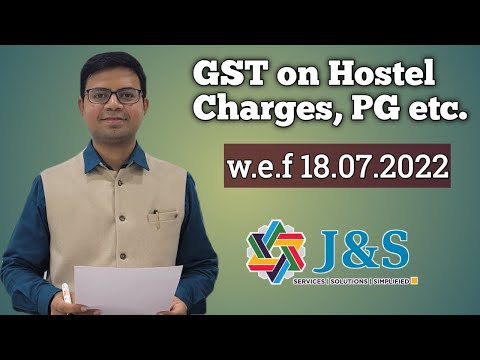Key Takeaway
- GST Varies by Property Use: Residential properties are generally exempt from GST unless used for business, like hostels or paying guest facilities.
- Service Provision Triggers GST: Including services like meals or laundry in rentals makes the entire operation subject to GST if above the threshold.
- Standard GST Rate Applies: Hostels providing additional services are charged GST at 18%, covering both lodging and auxiliary services.
- Compliance is Essential: Owners must manage GST registration, issue compliant invoices, maintain accurate records, and handle tax credits properly.
- Manage Compliance Challenges: Effective GST management involves staying updated on regulations, utilizing accounting software, and consulting tax experts.
Introduction to GST on Rental Properties
The Goods and Services Tax (GST) in India has significantly altered the tax structure across various sectors, including real estate and rental properties. For property owners, comprehending GST’s implications is critical to ensure compliance and optimize tax liabilities. Notably, while commercial properties are liable for GST, residential dwellings enjoy a GST exemption unless utilized for business purposes. Understanding these nuances is vital to managing financial implications effectively.
Understanding GST Applicability on Paying Guest Accommodations
Paying guest accommodations, which typically involve renting out a part of a residential dwelling unit complete with various services such as meals, laundry, and cleaning, present unique challenges under the GST regime. Unlike straightforward residential rentals, which generally benefit from a GST exemption, these facilities are often treated as taxable accommodation services. This classification means GST becomes applicable if the turnover from such facilities surpasses the GST registration threshold, essential for owners to grasp for compliance.
Tax Implications for Renting Buildings as Hostels
Renting out buildings as hostel accommodations introduces specific GST implications that significantly impact the financial operations of such enterprises. Unlike simple residential premises, hostels that provide additional hostel services such as cleaning, food, security, or Wi-Fi are often categorized under GST as service provisions. This categorization means that the entire operation may be subject to GST if the total revenue exceeds the prescribed threshold for GST registration.

For hostel operations, GST is generally levied not just on the rental of the hostel building but also on the ancillary services provided. The standard GST rate applied is 18%, which consolidates the tax for both lodging and the complementary services if these are inseparable. Hostel operators need to be diligent in segmenting their revenue streams (if possible) to apply GST accurately and to maximize input tax credits where applicable. Understanding these tax responsibilities is crucial for compliance and for optimizing the overall tax burden, ensuring that hostel owners can manage their operations effectively within the framework of the GST law.
Calculating GST for Different Types of Rental Accommodations
Calculating GST for rental accommodations requires understanding the specific nature and context of each rental transaction. For commercial properties, GST is applicable and typically charged at 18%. This includes office spaces, shops, and other properties rented out for business purposes. However, properties used solely for residential accommodation are exempt from GST.
When it comes to properties like hostels or paying guest accommodations, the situation becomes more complex. If these services include not only the provision of space but also other ancillary services like meals, laundry, or security, the entire offering may be considered a supply of services under GST. In such cases, GST is charged on the total value of the rental contract at the prevailing rate, currently set at 18%. Property owners must itemize these services and include them in their GST calculations to ensure full compliance.

For mixed-use properties, where part of the building is used for residential purposes and part for commercial activities, GST calculations must be prorated according to the usage. It’s essential for owners to maintain clear records of the usage of different parts of the property to correctly apportion the GST liability.
In all cases, understanding the applicable GST rates and correctly applying them to the total rental income is crucial. Property owners are advised to use accurate accounting methods to separate exempt supplies from taxable ones, ensuring that the GST charged is reflective of the actual services provided. This careful approach not only ensures compliance but also helps in optimizing the tax liability.
Compliance and Documentation Requirements for Property Owners
Property owners renting out spaces as residential or commercial accommodations must adhere to specific compliance and documentation requirements under the GST regime. These requirements are crucial for ensuring that all transactions are accurately reported and that the applicable GST is correctly calculated and remitted to the authorities. Here’s an overview of what property owners need to manage:
Registration: Property owners who meet the threshold for GST registration must register under GST. This is particularly important for those who provide additional services in hostels or paying guest accommodations, as their operations might be considered a taxable supply of services.
Invoicing: Proper invoicing is critical. Property owners need to issue GST-compliant invoices for every rental transaction. These invoices must include all necessary details such as the GSTIN, description of the service, total amount charged, and the GST rate applied.
Record-Keeping: Accurate record-keeping is essential for GST compliance. Property owners should maintain records of all rental agreements, invoices, receipts, GST returns, and other relevant documents for at least eight years, as required by the GST law. These records should be readily available for inspection by tax authorities when needed.
Filing GST Returns: Property owners are required to file periodic GST returns, depending on their turnover and the nature of their business. These returns should detail all taxable transactions and include any input tax credits that the property owner is eligible to claim.
Managing Input Tax Credits: If property owners incur GST on goods and services used to maintain or improve their rental properties, they may be eligible to claim input tax credits. Proper documentation and accurate claim filing are necessary to utilize these credits effectively, reducing the overall GST liability.
Compliance with E-Way Bill Requirements: For property owners involved in significant refurbishments or those who need to transport large quantities of goods for property maintenance, compliance with e-way bill requirements is necessary if the consignment value exceeds the specified threshold.
Adhering to these compliance and documentation standards not only helps property owners avoid penalties and fines but also enhances their reputation as responsible business operators. Regular updates from a GST consultant or tax professional can provide ongoing support to ensure that property owners remain compliant as GST regulations evolve.
Common GST Challenges for Paying Guest and Hostel Rentals
Owners and operators of paying guest accommodations and hostels frequently encounter several GST-related challenges. These complexities can affect compliance, financial planning, and day-to-day operations. Here’s a look at some common issues they face:
Classification of Supply: One of the main challenges is determining whether the rental is purely a supply of property or a composite supply that includes services. This distinction is crucial because it affects how GST is applied. For instance, if additional services such as cleaning, food, or laundry are provided, the entire arrangement might be treated as a service, attracting GST even if the underlying property rental might typically be exempt.
Threshold Limit Concerns: For small operators, just determining whether they need to register for GST can be challenging. The GST threshold limit applies to the aggregate turnover, and surpassing this limit necessitates registration and the consequent administrative workload associated with GST compliance.
Managing Input Tax Credits: Another significant issue is managing input tax credits effectively. Property owners often incur GST on goods and services purchased to maintain or enhance the property. However, efficiently tracking and claiming these credits can be complex, particularly when not all input credits can be directly attributed to taxable supplies.
Compliance with Frequent Law Changes: GST laws and regulations concerning rental accommodations are subject to frequent changes and updates. Keeping up with these changes and understanding their implications requires continuous vigilance and adaptability, often necessitating professional assistance.
Multi-rate Taxation: Applying the correct GST rate can also pose challenges, especially when different rates might apply to various components of the service provided. Misapplying rates can lead to miscalculations, underpayment, or overpayment of tax, each of which carries potential penalties.
Navigating these challenges requires a solid understanding of GST regulations, careful financial planning, and possibly the support of a knowledgeable tax professional. For many property owners, proactively managing these aspects can prevent costly errors and ensure smooth operational compliance.
💡If you want to pay your GST with Credit Card, then download Pice Business Payment App. Pice is the one stop app for all paying all your business expenses.
Strategies to Manage GST Compliance in Rental Accommodations

Navigating the complexities of GST compliance for rental accommodations, particularly for paying guest facilities and hostels, demands a proactive approach. Implementing effective strategies can mitigate the risks of non-compliance and streamline the process. Here are several practical strategies that property owners can adopt:
Stay Informed: Regularly update your knowledge on GST regulations relevant to rental accommodations. Tax laws often change, and staying informed through workshops, seminars, or online resources can help you remain compliant and leverage any available tax benefits or adjustments.
Use Technology Efficiently: Leverage accounting software and technologies that are compliant with GST regulations. Many modern systems offer tools for automating GST calculations, generating compliant invoices, managing input tax credits, and preparing and filing returns. This can significantly reduce the risk of human error and save time.
Maintain Accurate Records: Keep meticulous records of all transactions, including invoices, receipts, and contracts. Good record-keeping not only supports accurate GST filing but also provides protection in case of audits. Ensure that your documentation is organized and easily accessible.
Consult with GST Experts: Considering the complexities of GST law, consulting with a tax professional or a GST expert can be invaluable. These experts can provide tailored advice on issues like tax rate application, input tax credit eligibility, and compliance for your specific operations.
Regular Reconciliation Perform regular reconciliations of your accounts to ensure that all financial transactions match the records submitted in your GST filings. This practice helps in identifying and rectifying discrepancies in a timely manner, thus avoiding penalties associated with inaccurate filings.
Develop a Compliance Checklist: Create a compliance checklist specific to your rental business. This checklist should include regular tasks such as filing returns, renewing registrations, updating invoice formats, and reviewing tax rates. A systematic approach helps in ensuring nothing is overlooked.
By implementing these strategies, property owners of paying guest accommodations and hostels can manage GST compliance more effectively, ensuring they meet their tax obligations while minimizing administrative burdens.
FAQs
What is the GST implication for renting out a residential property as a guest house?
When a residential property is rented out as a guest house, it typically loses its GST exemption and becomes liable for GST if it includes services such as meals or laundry. This transformation categorizes the property under accommodation services, and GST is applicable if the turnover exceeds the registration threshold. Property owners should carefully assess the services they provide to determine the GST liabilities accurately.
Are individual kitchen facilities in a hostel subject to GST?
Individual kitchen facilities provided within a hostel do not independently alter the GST implications but are considered part of the broader accommodation service. If the hostel, including such facilities, provides additional services that contribute to making the entire operation akin to a business, then GST is applicable on the whole service supply at the prevailing rate, typically 18%.
How does the reverse charge mechanism apply to rental accommodations?
The reverse charge mechanism (RCM) may apply to rental accommodations if services are availed from an unregistered person. In such cases, the registered property owner is liable to pay GST directly to the government, assuming the tax responsibilities that would typically belong to the supplier. This mechanism ensures tax compliance across the supply chain, even when dealing with suppliers who are not registered under GST.
What GST exemptions are available for hotels and similar accommodations?
Hotels, including hostels that charge less than a specified rate per night (currently Rs. 1,000 per night), are exempt from GST. This exemption for hotels is designed to support the hospitality industry and make budget accommodations more affordable for consumers. Owners need to stay updated on the exemption thresholds to apply this benefit correctly.
What are the GST requirements for unregistered persons providing lodging services?
Unregistered persons providing lodging services are generally not required to collect GST unless their revenue crosses the GST registration threshold. Once this threshold is exceeded, they must register and comply with GST mandates, including filing returns and issuing compliant invoices.
Can a residential dwelling unit used for lodging services claim input tax credits?
A residential dwelling unit used to provide lodging services that are subject to GST allows the owner to claim input tax credits on related expenses. These expenses could include maintenance, renovations, or services consumed in providing lodging. The input tax credits can help reduce the net GST liability, providing significant tax savings under proper compliance.
What are the compliance considerations for a residence converted into a lodging facility?
When a residence is converted into a lodging facility that exceeds the GST registration threshold, it must be registered under GST. The owner must issue GST-compliant invoices and file periodic GST returns. It’s crucial for such business owners to maintain detailed records of all transactions and use appropriate accounting methods to ensure accurate tax calculation and compliance.








